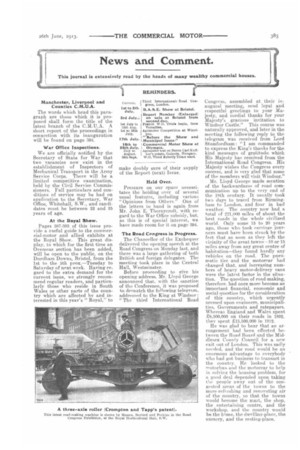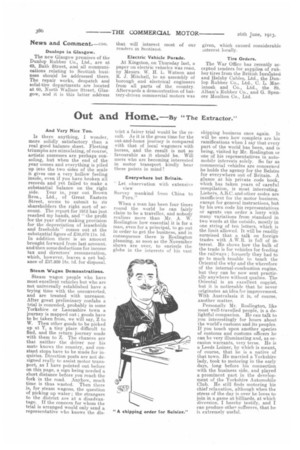News and Comment.
Page 11

Page 12

If you've noticed an error in this article please click here to report it so we can fix it.
This journal is extensively read by the heads of many wealthy commercial houses.
Manchester, Liverpool and Counties C.M.U.A.
The words which head this paragraph are those which it is proposed shall form the title of the latest branch of the C.M.U.A. A short report of the proceedings in connection with its inauguration will be found on page 394.
War Office Inspections.
We are officially notified by the Secretary of State for War that two vacancies now exist in the establishment of Inspectors of Mechanical Transport in the Army Service Corps. There will be a limited competitive examination, held by the Civil Service Commissioners. Full particulars and conditions of service may be had on application to the Secretary, War Office, Whitehall, S.W., and candidates must be between 22 and 25 years of age.
At the Royal Show.
Pages 387-393 of this issue provide a useful guide to the commercial-motor and allied exhibits at the Royal Show. This great display, to which for the first time an Overseas section has been added, will be open to the public, on the Durdham Downs, Bristol, from the 1st to the 5th prox.—Tuesday to Saturday of next week. Having re. gard to the extra demand for the current issue, we strongly recommend regular readers, and particularly those who reside in South Wales or other parts of the country which are affected by and interested in this year's " Royal," to make doubly sure of their supply of the Report (next) Issue.
Held Over.
Pressure on our space necessitates the holding over of several usual features, including various "Opinions from Others." One of the letters to hand is again from Mr. John E. Thornycroft, with regard to the War Office subsidy, but, as this is of special interest, we have made room for it on page 394.
The Road Crungress in Progress. The Chancellor of the Exchequer delivered the opening speech at the Road Congress on Monday last, and there was a large gathering of both British and foreign delegates. The meeting took place in the Central Hall, Westminster.
Before proceeding to give his opening address. Mr. Lloyd George announced that, with the sanction of the Conference, it was proposed to despatch the following telegram, addressed to the King at Windsor : " The third International Road Congress, assembled at their inaugural meeting, send loyal and respectful greetings to your Majesty, and cordial thanks for your Majesty's gracious invitation to Windsor Castle." This course was naturally approved, and later in the meeting the following reply to the telegram was received from Lord Stamfordham : "I am commanded to express the King's thanks for the kind messages of gratitude. which His Majesty has received from the International Road Congress. His Majesty wishes the Congress every success, and is very glad that some of the members will visit Windsor."
Mr. Lloyd George made mention of the backwardness of road communication up to the very end of the 18th century. It usually took two days to travel from Birmingham to London, and four in bad weather. The country now had a total of 231,000 miles of about the best roads in the whole civilized world. Only some 15 to 20 years ago, those who took carriage journeys must have been struck by the fact that as soon as they left the vicinity of the great towns-10 or 15 miles away from any great centre of habitation—they found hardly any vehicles on the road. The pneumatic tire and the motorcar had changed that, and increasing numbers of heavy motor-delivery vans were the latest factor in the situation. The question of road-making, therefore. had once more become an important financial, economic and social question for the consideration of this country, which urgently Dressed upon engineers, municipalities, Governments and ratepayers. Whereas England and Wales spent 28,500,000 on their roads in 1892, they spent £15,500.000 in 1912.
He was glad to hear that an arrangement had been effected between the Road Board and the Middlesex County Council for a new exit out of London. This was sadly needed, and the road would be an enormous advantage to everybody who had got business to transact in the country. He looked to the motorbus and the motorcar to help in solving the housing problem, for a good deal depended upon taking the people away out of the congested areas of the towns to the more.refteshing and renovating air of the country, so that the towns would become the mart, the shop, the entertaining centre, and the workshop. and the country would be the home, the dwelling-place, the nursery, and the resting-place. Dunlops in Glasgow.
The new Glasgow premises of the Dunlop Rubber Co., Ltd., are at 63, Bath Street, and all communications relating to Scottish business should be wddressed there. The repair works, despatch and solid-tire departments are located at 60, North Wallace Street, Glasgow, and it is this latter address that will interest most of our readers in Scotland.
Electric Vehicle Parade.
At Kingston, on Thursday last, a paper on electric vehicles was read, by Messrs. W. H. L. Watson and R. J. Mitchell, to an assembly of borough and electrical engineers from all parts of the country. Afterwards a demonstration of battery-driven commercial motors was
given, which caused considerable interest locally.
Tire Orders.
The War Office has recently accepted tenders for suppliefs of rubber tires from the British Insulated and Helsby Cables, Ltd., the Dunlop Rubber Co., Ltd., C. L. Macintosh and Co., Ltd., the St. Alban's Rubber Co., and G. Spencer Moulton Co., Ltd.
































